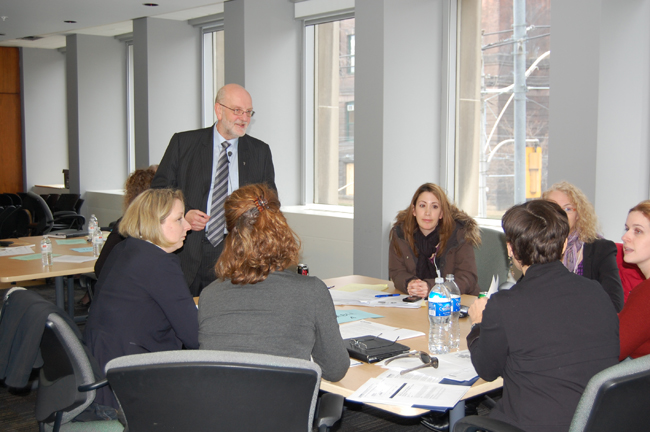Do the means justify the ends as Machiavelli so eloquently wrote? Some may argue that patient care is always first and foremost for nurses and for that reason; politics have no place in this profession. Rev. Tom Keighley, a Frances Bloomberg Distinguished Visiting Professor, with his 40 years of nursing experience as a practising RN, political lobbyist in Westminster, England and abroad, and advisor on health care and research to the European Commission would disagree.
On Thursday, January 17, 2013, the Centre for Professional Development presented “Machiavelli got it right! The use of political skills in nursing leadership” a workshop that drew on Rev. Keighley’s impressive career advancing health care through the political machine. A popular workshop that has inspired nursing leaders across Europe to hone their political skills, his presentation had similar effect for his Toronto audience.
Through a simple remark in his opening statements that “decision-making generally tries to remain rational but tends to be based on irrationality,” Rev. Keighley expertly touched on the crux of what brought people to the course. The nursing professionals in attendance all had different levels of leadership and came from a wide-range of health care organizations, but all shared examples of struggling with similar themes in their workplaces. Namely that in an effort to improve patient care, the perceived resistance to good ideas could only be explained by how easily those ideas became entangled into the web of health care politics.
“The key learning for me was the importance of advance preparation – be aware of what is going on locally and internationally, identify key influencers, and have a prepared “pitch” for key issues to use when the opportunity arises,” said Jann Houston, director, Healthy Communities, Toronto Public Health and workshop attendee. “It’s important to remember that nurses can develop and use their political skills whether on the front line, in middle management or as senior leaders.”
Peeling back the layers of organizational politics, Rev. Keighley presented the workshop with a clear approach and taught an understanding of political processes in shaping organizational agendas, having attendees study their model of decision-making and negotiating styles and group work on a case study to hone critical and strategic thinking. From the timing of a political opportunity, like presenting a four-year term government with a three-year health plan so the government can claim success when they run for re-election, to studying body language to determine if your agenda is getting a positive reaction, Rev. Keighley gave concrete examples of how health care changes really come about. Providing this in-depth analysis and antecedents from his own career experiences, Rev. Knighley demonstrated how every nugget of information can help propel a political argument that ultimately has positive change in patient care.
“Addressing that politics is a tangible part of nursing is important because nurses, in some way, feel the need for permission to become political,’ said Rev. Tom Keighley. “When you equip nurses with the skills to navigate politics within health care, this engages a significant portion of the local community to become political and drive health care agendas forward.”
